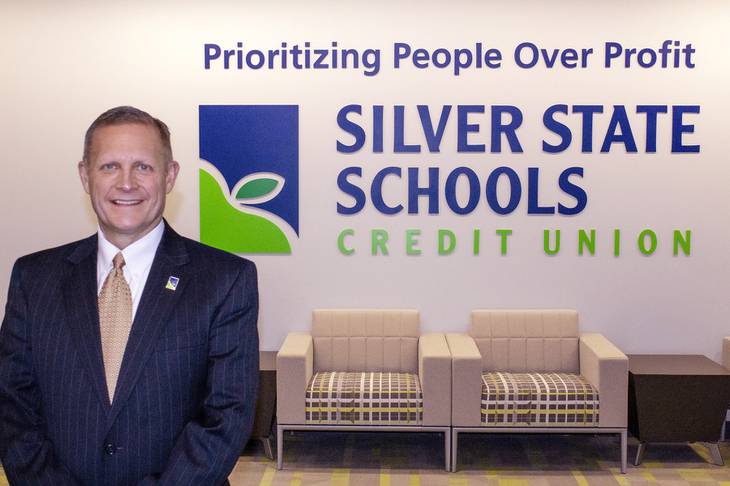Scott Arkills, president and CEO of Silver State Schools Credit Union, speaks passionately about improving people’s lives through teaching financial literacy. “It’s incredibly important to me,” he says, “and something I have dedicated myself to.”
Arkills conducts seminars on subjects such as “Understanding Credit,” “How to Finance an Auto” and “How to Finance Your First Home Loan,” and at a previous job, he partnered with a local university on a financial boot camp to integrate academic learning with real-life experiences.
Now Silver State, which is celebrating its 70th year, is in the process of opening branches at local schools to support that mission.
“As part of this financial literacy focus, the credit union is planning on conducting public financial literacy seminars,” Arkills said. “It also is in the process of working with local universities to create an executive mentor program to provide specialized financial literacy seminars to juniors and seniors preparing to start their careers.”
What are the advantages and disadvantages of leading a credit union compared to a for-profit bank?
As a past 25-year veteran of for-profit banks and large financial services organizations, I often like to cite the primary differences between credit unions and banks. Credit unions are not-for-profit cooperatives where customers are member-owners. What that means is, credit unions are essentially of the community and for the community they serve. They are focused on being ultimately responsible for their members’ financial health. While proceeds earned by credit unions are reinvested in the day-to-day operations, they are also returned to members in various ways, such as lower fees and loan rates, as well as higher interest on deposits and the expansion of branches, ATMs, technology and services. What ultimately makes credit unions different, though, is our dedication to member service and to fulfilling our social purpose of “people helping people.” Banks, on the other hand, are profit-driven institutions with shareholders to please every quarter, and they benefit from charging late fees, returned check fees and generally higher loan rates.
Some of the disadvantages of credit unions are that while anyone can become a bank customer, credit union membership is generally limited to a shared affiliation with a certain group. Banks also enjoy some business lending advantages that credit unions are limited to because of our not-for-profit tax status.
In what ways has the pandemic affected your credit union?
We have offered our members over $60 million in mortgage forbearances and consumer loan deferrals since March. Our credit union, like many others in our market, has experienced dramatic deposit and asset growth. Somewhat surprisingly, in 2020 we saw continually strong loan originations, primarily driven by historically low mortgage interest loan rates. Our ongoing pandemic-related concern, shared by the entire financial sector, is tied to the potential increase in delinquencies and loan losses driven by continued high local unemployment rates.
What initiatives are in place that sets SSSCU apart?
Our philanthropic commitment to giving to the communities that we serve. In 2020, SSSCU created a not-for-profit People Over Profit (POP) Foundation, charged with the dual purpose of making charitable contributions to the betterment of the education community, as well as to local charities.
Other than the obvious, what’s the greatest issue facing Southern Nevada?
The education of our children. Although improving, we will need to continually invest resources in education and make a commitment to improving our national standing. This will ultimately attract more businesses and people to Southern Nevada, which will benefit all of us.
What is your dream job outside your current field?
To be a teacher or professor. Coming out of college, that was originally going to be my career path, and I have always found education to be one of the most important and essential pieces of our society.
What are you currently reading or binge-watching?
A book called UnBranding, by Scott Stratten & Alison Stratten. Written in 2018, it’s a book of 100 branding lessons for the Age of Disruption.
What is something that people might not know about you?
I have competed in about 170 triathlons since starting in 1998. I concentrate on Olympic and sprint distances, and I have qualified for Nationals in my age group twice. This was born out of being a competitive swimmer when I was a teenager.
